- Home
- M G Vassanji
A Delhi Obsession Page 2
A Delhi Obsession Read online
Page 2
She stretched forward, alarming him, before he realized she was searching behind him. “He should be coming. Though he always finds his former army buddies wherever he goes! So frustrating.”
Munir didn’t want her Ravi to come yet. She was hardly simple, but that traditional look—shouldn’t there be a red dot instead of the blue sparkle? But what did he know of being Indian?
“You are silent. What are you thinking?”
“If you could be real. I thought women like you existed only in the old Indian films.”
What gave him the courage? Normally he wasn’t so brash, so mischievous.
“I look old-fashioned, you mean?”
“In a nice way.”
“A sari may be old-fashioned to you, but many Indian women wear it. You can look around the room and see.”
“I am aware of that. But I didn’t mean to offend you. And I admit I am ignorant about India.”
That brought on a look of surprise. She leaned forward, searching his face.
“You are Indian and you are ignorant about India? That’s a shame. Why is it that people who leave India want to forget about it as soon as possible? We should know about where we come from!”
“It’s too late for me.”
“It’s never too late!”
“I was born in Kenya, actually.”
“But you are Indian—aren’t you?”
In Nairobi he would have vehemently denied this, but out in the world you had to supply all the nuances as to who you were. He said, “I suppose I am…in a sort of way.”
Neither of them spoke, then. She took a quick, anxious look around the room. Her husband was not to be found. The crowd had depleted measurably, most people having decided perhaps it was not worth the wait for a table. She returned her gaze to him and gave a wan smile.
“Why Delhi? Ours is not the friendliest of cities.”
“Well, I had to start somewhere. And Delhi has such a rich history.”
“You’ll need a guide. I suggest you hire a day taxi.”
“I have already done that, the last two days.”
She looked curiously at him. “You’re seeing the tourist India.”
“Why not?”
“No reason.”
But then he asked, daring even further, “Would you like to show me around the non-tourist Delhi?”
* * *
—
What had got into him? First a flattering comment. And then asking her out. A married woman. A married Indian woman. As he waited for her to reply, her phone rang and she spoke briefly into it in Hindi. Then she looked up and said, “Yes! I’ll show you around. I think I can trust you. But I have to go now, that was my husband, he’s picking me up. Now the table is all yours and you don’t have an old-fashioned Indian woman disturbing your peace!”
Rather archly.
He returned a sheepish look and signed his bill. They left together and parted at the driveway, where she waited for Ravi, and Munir went inside the building and back to his room upstairs.
The next morning she called and arrived shortly after to pick him up.
“You have a driver,” he observed, as he got into the back beside her, somewhat disappointed. She was in salwar-kameez, he noticed, but the blue dot—which he had thought should be red—was as prominent as it had been the night before.
“Yes, it’s impossible for normal people to drive in Delhi anymore, and it’s getting more impossible every day. Tell me what you would like to see.”
“I didn’t think you would come. I seemed to have offended you last night.”
She looked pleased. “Not offended, actually. Unless by an old-fashioned actress you meant Tun Tun.”
“Who was she?”
“The round, fat one. And very silly.”
They laughed. “Well? What would you like to see?”
“What do you suggest?”
“I suggest we first go to Old Delhi. The Red Fort, from where the Mughals ruled India. And the great mosque. That should interest you. You people ruled us for seven centuries, you know.”
“Oh? All right, to Old Delhi then.”
He wondered about you and us. You people? It amused him. He could never have come up with these designations.
His knowledge of the Mughal Empire was perfunctory—vague memories of history lessons in school and a popular Hindi film seen in childhood, which he had found exotic and barely understood, and lately a few book reviews. There seemed a certain romance attached to the period, a nostalgia, though there was hardly a hint of that in the modern city they were driving through. She told him that historically there had been several cities of Delhi. They were driving through the most recent one, New Delhi, which was the contribution of the Britishers (as she called them) when they made it the capital of the Raj. It was designed by Sir Edwin Lutyens. People were now calling it “Lutyens’s Delhi,” talk of colonial hangovers! She beamed as she pointed out the India Gate inside a lush green park which they circled, the presidential residence on its exclusive hill, called Raisina, the row of crafts shops from all the states of the country, and Connaught Circus, and as he watched with reflective wonder, he could feel her eyes upon him.
“You see, India is not all poor and dirty.”
“I never said that.”
“But all this is British-built. No architecture of significance has been built since Independence, as Ravi often says.”
The streets became progressively busier and chaotic, until the driver came to a stop near an ancient-looking archway. “Here we get off,” she said, opening the door on her side. They were at the Ajmeri Gate of the old city, and as he stepped onto the broken pavement and looked around him he thought to himself that this was the India he had heard and read about—and feared: crowded, jostling, cluttered, and infinitely noisy. The sun came down like a bludgeon and he was already soaked in sweat. There was the constant bustle and scream of activity, rapid changes of scene in all the three hundred and sixty degrees around him. She held on to his arm to steady him. A bicycle rickshaw stopped and offered its services, and with some difficulty, she going up first and pulling him in, the two of them clambered up the shaky contraption. “Jama Masjid,” Mohini briskly instructed the driver and off he went, struggling initially to get their two weights rolling with his thin legs. The ride was wobbly and bone-shaking. They hardly spoke, pretending they were not actually touching in the confined space of their seat. The narrow street was jammed with rickshaws and pushcarts, pedestrians squeezing through any space they could find. One odd motorbike threaded its way past them, claiming rights by virtue of power and noise. This is India, he thought; would I have experienced it on my own, so close, in this rawness? The city of my forebears, even if a hundred years removed. He smiled his gratitude to her.
“I rarely come here,” she raised her voice to explain, “but I thought you would enjoy experiencing the real India.” She casually pulled out the end of her dupatta-headscarf from under him.
“Thank you. And the other India, of the Recreational Club—isn’t that real?”
“The DRC? A bit removed. But it’s necessary, don’t you think? Who can stand this bheed all the time?” She indicated the street scene outside with a wave of a hand.
“Most of these people live here, I presume,” he said, watching her.
“Most of them, yes. Could you?”
There hid a certain aggression behind that friendly manner, he had noticed this the previous night too, it sparked out in those quick, sudden retorts. What unconscious animus could it possibly rise from? But the friendliness must be genuine, or why take time off to show a stranger a more authentic India? Perhaps she regretted it already, this adventure in the dust and heat? He watched her as she exhorted the driver to please not go over the potholes.
Suddenly a wave of brilliant warm sunlight fell upon them, and they had
reached the open end of the street. Before them, behind a wall, lurked the great mosque, its immense white dome rising up into a shimmering sky. The area outside was grungy, with motor spares spread out on sidewalks, vendors selling fruit from carts, hoardings on the building-fronts advertising rooms for rent and trips to Mecca and elsewhere. The rickshaw turned shakily round the corner and proceeded to the front side of the mosque, where they scrambled out. A crowded street led off from there, lined with eating places. They turned towards the mosque and passed through the security gate where three bored-looking men in deep khaki sat with automatics on their laps. They climbed up the wide steps of the mosque, removed their shoes, and entered an arched doorway into a large square terrace. The pavement was burning hot, though a running red carpet gave respite. Tall, thin minarets rose up at the four corners. Narrow arcades ran along three sides of the square, shady shelters where weary travellers had put down their loads and stretched out their legs. On the fourth side, under the dome, was the shallow, covered recess of the prayer hall, facing, presumably, Mecca to the west.
The red runner took them straight to the centre of the square, next to a fountain, the midday sun merciless on their uncovered heads. The milling crowds were local visitors and foreign tourists taking pictures with phones and cameras; a few men did their practiced ablutions at the fountain. It was an awe-inspiring place, the tall minarets, the immense white dome over the open prayer hall, its walls—what we could see of them—intricately, emphatically carved with the message of God that spoke to some but not to others.
“Would you like to go and pray?” she asked, looking up at him.
“What? No, thank you.”
She gave a look of surprise. They walked over to a side to look at the Red Fort in the near distance.
“That is where the emperors lived. The last one was exiled to Burma after the Mutiny of 1857—we call it the First War of Independence. He died there—in Burma. Myanmar nowadays. He was a great poet. Bahadur Shah Zafar.”
The name meant nothing to him.
Immediately below them was a market with makeshift stalls. A man who could have been a snake charmer sat forlorn under a tree before a basket. Snatches of a vigorous vocal music rose up to them. He recognized it as qawwali. All that is imposing, mysterious, and architecturally impressive—he mused to himself—lies dead amidst all that’s makeshift, crowded, dirty, and rotting—the tumultuous, organic, and living. How different from all the Western cities he’d been to. He thought of Aileen. What would she have made of this?
They came out of the mosque, both a little subdued, and walked awhile through a maze of streets, and finally entered one that looked vaguely different from the others. It was special, she told him pertly, leading the way. It was wider and neater, quieter than the others, with no eating places and no goats around. Midway along they came to a wide-open gate which they entered to find themselves in a yard surrounded by low residences. Three boys were playing cricket but stopped when they entered; two young women looked down at them from a small balcony. Mohini turned to Munir.
“Well, what do you think?”
“I don’t know. What should I think?”
She smiled.
“This is a haveli. In former times an entire extended family would live here together, in the rooms at the four sides. But now it has been divided up and there’s been some construction, as you can see. But this particular haveli is where Kamala, the wife of Jawaharlal Nehru, our first prime minister, was raised. Imagine, the aristocratic Nehru family coming here, Nehru himself on the bridegroom’s horse, to escort the bride away!”
She was charming when she was excited—her eyes opened wider, and the smile was mischievous. She was enjoying her control over him.
Outside, further up along the street, they came to what seemed like a hole in the wall, a crooked doorway into a dark space, through which a few women were trickling in and out. By their demeanour he realized that this was a temple. “Wait here,” she said, throwing off her heeled sandals outside. “I won’t be a minute.”
“Can’t I come with you?”
“Really? Yes, certainly you can. It’s a temple.”
He followed her into a dark room, long and narrow with a grimy cement floor; on their right, towards the back of the room, a few women had taken shelter to rest; to their left, against the wall, was a dimly lit shrine. And right above them was the strangest sight: a large and heavy metal ring descending from the ceiling, with numerous little brass bells suspended all around its rim and centre. The shrine was modestly decorated with marigolds and an idol of a god, behind which quietly sat the priest. Mohini covered her head with her sari end, joined her hands and knelt before the idol. Munir looked around nervously, then shakily half-knelt beside her, joining his hands too. The priest gave them some water, which, following Mohini, Munir sipped from his hand, dabbing his head with what remained. The watching priest then gave them each some coarse sugar pellets.
When they were outside, back in the brightness, she turned to him and said, “But you are a Muslim.”
He took a breath, then replied, “If you say so. But I don’t describe myself by a faith.”
He felt stupid saying that, but it was the naked truth.
“But you bowed to our gods.”
“Your gods…Well, I paid my respects to the gods.”
“What are you, then?”
“Do I have to be something?”
“How do people know you, then?”
“As just another person. A friend. A neighbour. An author.”
“All right, then. Just a person. Just an author. But I’m not convinced, I can tell you that.”
He laughed. “Yes, just a person. Could we go to that glittering street that we passed? The one with all the lights?”
“Dariba Kalan—the jewellery market? You are full of surprises! Let’s go. I can help you with the bargaining, if you want to buy something for your wife.”
He opened his mouth to explain, but said nothing. A bicycle rickshaw took them to the jewellery market. It was less busy than suggested by all its glitter, but she explained that many shoppers came later in the day and on the weekends.
“You cannot have a wedding in Delhi without half a dozen visits here, believe me. Invitation cards, decorations, jewellery—gold, silver, diamond and whatnot—everything you need for a wedding you can find here. Except alcohol.” She smiled.
They walked a short distance down this street, and back up again. Is this it? he said to himself. Is this where Dada came from? When he was young, to his ears “Dariba” had been synonymous with Delhi. How fateful to find himself here. A vague sense of possessiveness had come over him. He peered into shops, stared at the owners who stared back over their glass counters. On an impulse he walked into an alley to examine the residences there. All the while she watched him with amusement. Finally they went inside a shop, and he bought a pair of gold earrings.
“A successful visit to Old Delhi, then. And you purchased something.”
“Yes. Thank you. But I’m exhausted now.”
“Let’s eat first, then we’ll return to that haven where you’ve put up. Do you have a strong stomach?”
“I think so. How strong?”
“Let’s take a chance. Nothing ventured, nothing gained, as we say. There’s a place nearby called Karim’s. It’s world-famous and it’s been here since the time of Bahadur Shah. Karim himself was one of the emperor’s chefs. Your visit would not be complete without eating here.”
“To Karim’s, then.”
“Tally-ho.”
Karim’s was one of a cluster of eating places nearby that all offered the same cuisine, kebabs and biryani occupying pride of place, releasing enticing aromas into the street. Of them, Karim’s had the distinction of having its entrance leading inside through a passageway to a counter. Behind it were scattered a number of modest dining rooms on t
wo floors. They were taken to an upper room, which was less full and where a few young tourists were being served.
“You eat non-veg, of course?”
“Meat…? Yes, in moderation. And you…?”
“Sometimes. But I don’t eat beef. Well, not usually, anyway.” She smiled. “I’ll join you if you do.”
They had lamb kebabs and a vegetable curry with naan.
She asked, and he told her about himself. He was recently widowed. He had been an analyst at the private wealth sector of the Bank of Montreal, but left some years ago to pursue writing. Not a wise decision, it turned out. He had arrived in Toronto from Kenya as a graduate student. His wife, Aileen, had worked at the bank too; that’s where he met her. They had a daughter, Razia, who was in New York.
“You did well in Canada.”
“Yes, I’ve done well. Too well, perhaps.”
That was too quick and a mistake.
“How can you do too well?”
He shrugged, and she said, “I see.”
But did she? The good life, the enviable success—and he was still looking for that edge through the softness that was Canada, searching for that rawness that he seemed to have lost. Even this despair of the artist seemed somehow a luxury and false. Was anything real at all anymore? But perhaps there had been a tingle of relief, a rush of sinful release in his recent loss of his wife? He looked at her.
“And you?”
She wrote a weekly column for the daily paper the Express Times and taught a course in English at a college twice a week. Her family were refugees from Sargodha, which became a part of Pakistan after the Partition. Did he know about the Partition? Yes, he did. Her family migrated to Delhi, and later moved to Shimla when her father was offered a teaching job at the university. She had married early—Ravi’s family happened to be holidaying in the hills from Delhi, and spotted her. She was a good catch, she informed him, with a twinkle in her eye, educated but traditional. And pretty. Again that twinkle. They had two daughters. Asha was sixteen and still at school, Priya was nineteen, at university in Hyderabad. Ravi was in the security services and travelled constantly. Very hush-hush, and let’s not talk about it. “So we could be being watched.”

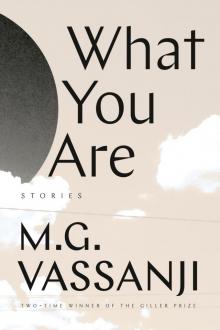 What You Are
What You Are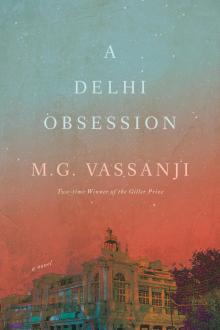 A Delhi Obsession
A Delhi Obsession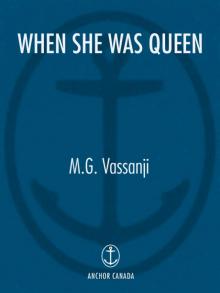 When She Was Queen
When She Was Queen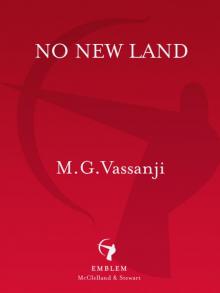 No New Land
No New Land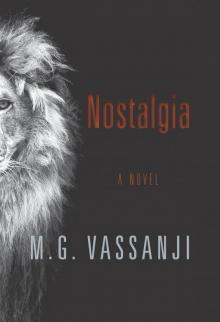 Nostalgia
Nostalgia Mordecai Richler
Mordecai Richler The Book of Secrets
The Book of Secrets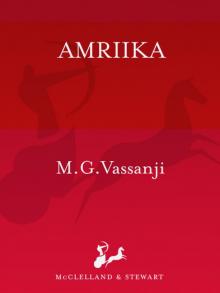 Amriika
Amriika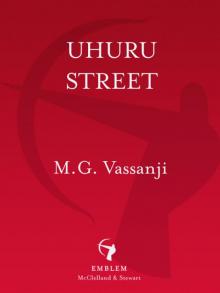 Uhuru Street
Uhuru Street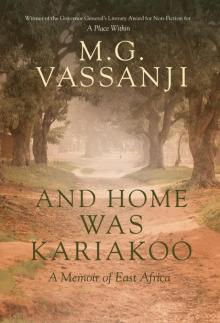 And Home Was Kariakoo
And Home Was Kariakoo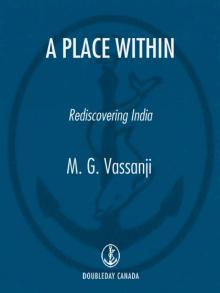 A Place Within
A Place Within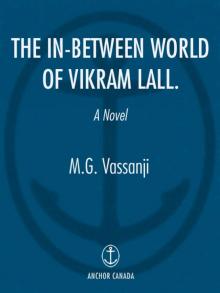 The In-Between World of Vikram Lall
The In-Between World of Vikram Lall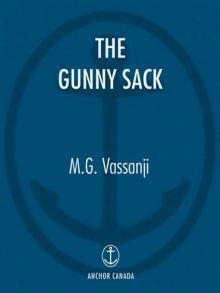 The Gunny Sack
The Gunny Sack